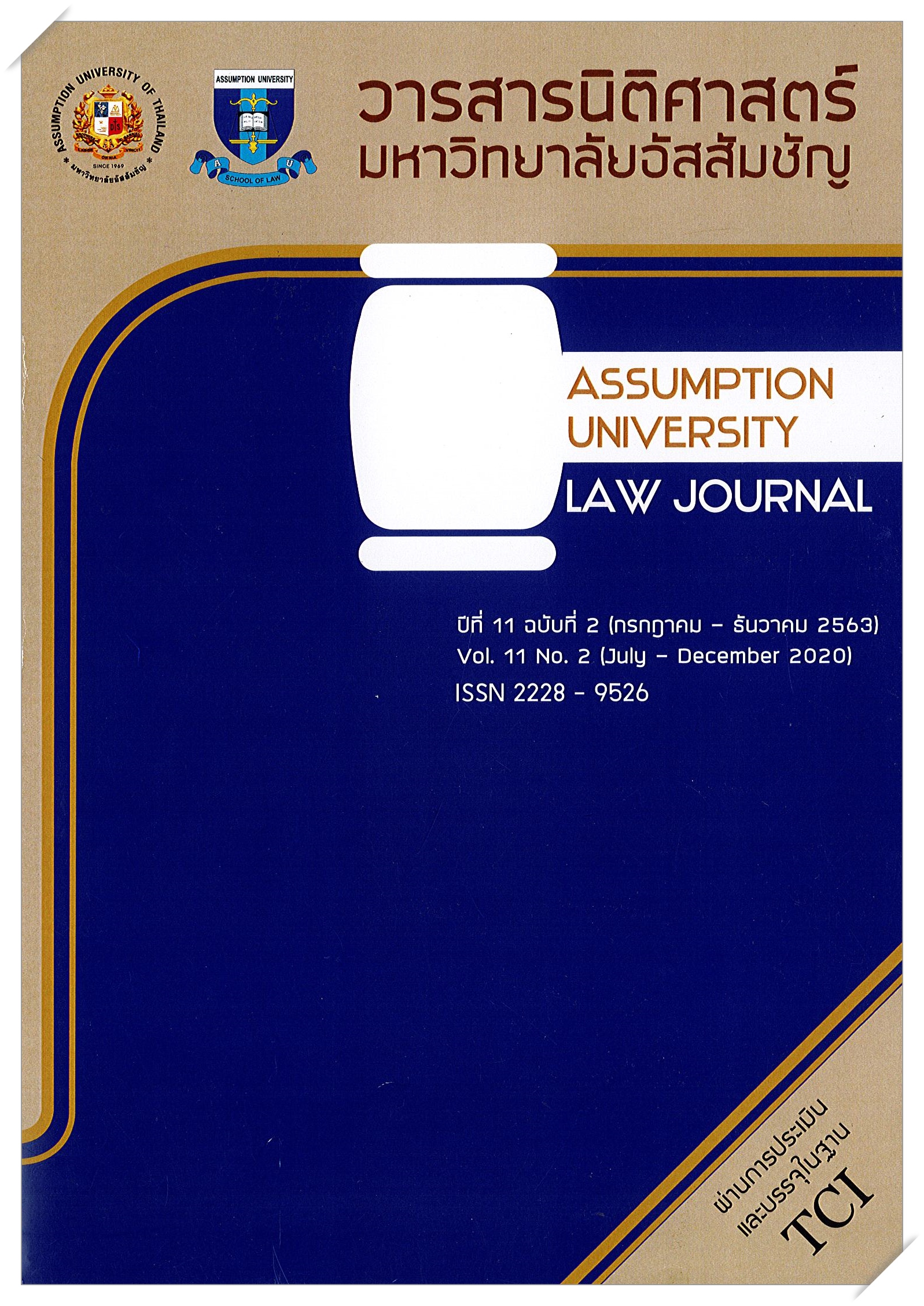ปัญหาชนกลุ่มน้อยโรฮิงญาในประเทศเมียนม่า: บทบาทและการให้ความช่วยเหลือของประเทศบังคลาเทศ <br> Rohingya Crisis of Myanmar :The Role and Aid of Bangladesh*
Keywords:
ปัญหาผู้อพยพชาวโรฮิงญา, การละเมิดสิทธิมนุษยชน, ความสัมพันธ์ระหว่างบังคลาเทศและเมียนมา, คดีแกมเบียและเมียนมาในศาลโลก , Rohingya Refugee Crisis, Human Rights Violation, Bangladesh, Myanmar Relations, The Gambia vs. Myanmar International Court of JusticeAbstract
บทคัดย่อ
บทความนี้ได้นำเสนอผลกระทบจากการที่ประเทศเมียนมาได้กระทำต่อชนกลุ่มน้อยชาวโรฮิงญาทำให้มีผลเป็นการอพยพไปสู่ประเทศเพื่อนบ้านใกล้ๆ โดยเฉพาะประเทศบังคลาเทศ โดยดูจากจุดกำเนิดของวิกฤตการณ์และกฎหมายที่เกี่ยวข้องตลอดจนสถานการณ์ปัจจุบันจุดยืนขององค์การสหประชาชาติและสหรัฐอเมริกา จีน รวมทั้งอินเดียซึ่งถือว่าเป็นประเทศที่มีอิทธิพลภายในภูมิภาคโดยเฉพาะอย่างยิ่งการมีอิทธิพลเหนือประเทศบังคลาเทศ บทความนี้ได้ข้อสรุปว่า แม้ว่าประชาคมของโลกจะรู้สึกเห็นอกเห็นใจต่อผู้ลี้ภัยไร้รัฐชาวโรฮิงญา แต่ประชาคมโลกก็ยังไม่สามารถที่จะยื่นมือเข้าไปช่วยเหลือหรือหาทางออกเพื่อแก้ไขวิกฤตการณ์ในครั้งนี้ภายใต้กรอบของกฎหมายระหว่างประเทศที่เกี่ยวข้อง การจะเสนอแนวทางแก้ไขปัญหาในเรื่องนี้มีความเกี่ยวข้องและแรงกดดันจากประเทศต่างๆ เช่นจีนและอินเดียซึ่งถือว่าเป็นมหาอำานาจในภูมิภาคและยังมีแรงกดดันจากประชาคมโลกอย่างเช่นกลุ่ม G8 ซึ่งพยายามมีบทบาทใน วิกฤตการณ์มนุษยธรรมต่างๆ ตลอดจนความรับผิดชอบร่วมกันของนานาประเทศซึ่งส่งเสริมให้เกิดความสามารถในด้านของโครงสร้างพื้นฐานและระบบเศรษฐกิจ คำตอบสุดท้ายสำหรับกรณีของชาวโรฮิงญาอาจจะเป็นไปได้คือ ประชาคมโลกร่วมกันแสดงท่าทีกดดันให้เมียนมารับเอาผู้อพยพชาวโรฮิงญาพร้อมทั้งให้สิทธิในสัญชาติแจกคนเหล่านั้น
Abstract
This article presents the effects of Myanmar’s persecution of its Rohingya minority population that, in effect, triggered an exodus to their nearest bordering country Bangladesh. It looks at the origins of the crisis and relevant laws, current situation, position of the United Nations, the United States, China and India being major influences in the region, and the overall role of Bangladesh. The article concludes that although the global community appears to be sympathetic towards the plight of stateless Rohingya refugees, they are unable or not very keen on seeking a swift resolution to the crisis resolve the crisis in line with the pertinent international legal framework. The recommended solutions to this ongoing crisis involves a greater amount of involvement and pressure from states such as China and India, considered to be the region powers, as well as the more influential global communities such as the G8 taking a tougher stance to the humanitarian crisis, and finally an approach of shared responsibilities among countries with established infrastructures and economic capabilities. A lasting answer to the Rohingya crisis may be plausibleonly whentheglobal community takes afirm stanceinfavorof compelling Myanmar to repatriate the Rohingya refugees with full citizenship rights.
Downloads
Published
Issue
Section
License
- บทความทุกเรื่องได้รับการตรวจทางวิชาการโดยผู้ทรงคุณวุฒิ (Reader) จากภายในและนอกมหาวิทยาลัย
- ความคิดเห็นใดๆ ที่ลงตีพิมพ์ในวารสารกฎหมายคณะนิติศาสตร์ มหาวิทยาลัยอัสสัมชัญ เป็นของผู้เขียน (ความคิดเห็นใดๆ ของผู้เขียน กองบรรณาธิการวารสารกฎหมายคณะนิติศาสตร์ มหาวิทยาลัยอัสสัมชัญไม่จำเป็นต้องเห็นด้วย)
- กองบรรณาธิการวารสารกฎหมายคณะนิติศาสตร์ มหาวิทยาลัยอัสสัมชัญ ไม่สงวนสิทธิในการคัดลอก แต่ให้อ้างอิงแสดงแหล่งที่มาด้วย


